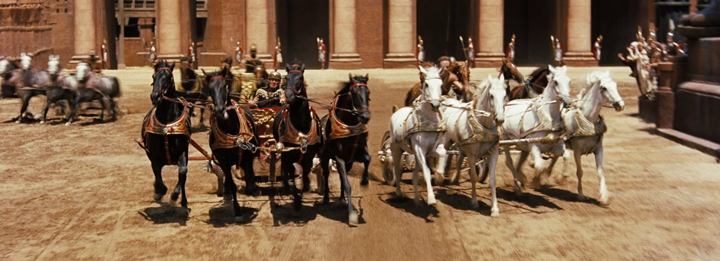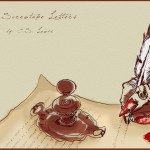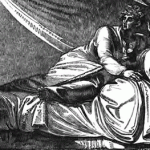Recently, Slate ran a fascinating long-form essay on the life of Civil War general and best-selling author Lew Wallace. The article began by telling the story of how Wallace came to write his famous novel Ben-hur, which today is more via the 1959 epic film adaptation starring Charleton Heston. Wallace was riding on the same train as one of his former soldiers, the famed atheist speaker and writer Robert Ingersoll. Wallace joined his friend in his car and they promptly began discussing religion and theology. After a brief time, Wallace realized that he wasn’t entirely sure what he himself thought of religion and Christianity in particular, so he decided to do something about that.
But whereas most of us would have conversations with friends or read a bunch of books, Wallace sat down and wrote an epic novel set in the time of Christ that, as narratives go, closely resembled the popular Horatio Alger tales of the day. The book was a runaway hit, becoming one of the most popular novels of the late 19th century and early 20th. And nearly 80 years after the book’s publication, its popularity lived on through the film adaptation.
What’s most striking about the film, from a Christian perspective, is the ending. Throughout the story, the title character, the wealthy Jewish noble Judah Ben-hur, comes into contact with a rabbi from Nazareth named Jesus.
After he is betrayed by childhood friend Massala and is being taken to the Mediterranean to serve his sentence on the galleys, Ben-hur’s group passes through Nazareth, where a young carpenter gives a struggling Ben-hur water. (At the time, Judah doesn’t know the man’s identity and he doesn’t learn it until the Crucifixion scene.) Later, Jesus pops up intermittently at different points in the story, but he himself never speaks (others report his words) nor is he pictured. For much of the story, Ben-hur resists the rabbi’s message, holding fast to his lust for revenge against Massala, all the while unaware that this rabbi is the same man who gave him water when he was nearly dead from exhaustion. Like some of Wallace’s contemporaries in the late 19th century, Judah sees in Christianity nothing but weakness. To Judah, embracing this strange rabbi’s teaching seem like little more than allowing people to walk all over you.
Then the Crucifixion scene happens and everything changes. First, Judah sees the rabbi’s face for the first time and recognizes him as the man who gave him water all those years before in Nazareth. And he runs to Jesus’ aid and their roles are reversed—Judah gives a dying Christ water. Second, as Jesus dies, a storm descends on Jerusalem. Judah’s love-interest, Esther, is away from Golgotha with Judah’s sister and mother, both of whom have become lepers. But as the rain from the storm falls, their leprosy is healed. And so the story ends. Judah is healed of his lust for revenge and Miriam and Tirzah are healed from their physical ailment.
Taken as a whole, Wallace’s story demonstrates how difficult it can be to articulate Christianity faithfully while immersed within specific cultural contexts. On the one hand, it’s actually quite remarkable how well Wallace draws the line between Judah’s lust for revenge and power and the Gospel. In the late 19th century world, it was very easy to see Jesus’s message as being very weak and unsuited to the modern world—hence the scorn heaped upon it by folks like Nietzsche and Wallace’s friend Ingersoll. The fact that Wallace makes that lust for power the dividing line in Judah’s conversion narrative shows that he understood something important about Christian faith. Yet even with that significant strength, Wallace’s story has one enormous hole: It ends on the crucifixion, not the resurrection. The moral of the story seems to be that Jesus had some degree of supernatural power that caused the rain to heal Miriam and Tirzah. But his real power came from his message of peace and forgiveness, of showing compassion to the weak—which is probably why they killed him. In other words, Jesus becomes a martyr for a cause, a hero whose story derives its power from its inspirational message. He becomes rather like Martin Luther King Jr or, perhaps of more significance to a former Union general in the Civil War, Abraham Lincoln. His death “saves” Judah by awakening him to his selfishness, and resentment, and showing him how his lust for revenge was poisoning his soul.
But there is no resurrection. That ending leaves us with a sentimental message that plays well to an audience, but isn’t much of a way to live. Essentially, it says “Nice guys may get crushed by the powerful, but at least they’re pleasant, compassionate people.” As a syrupy truism it works, but it’s cold comfort to the victims of the powerful who lose everything for their compassion and are left with no hope of restitution or redemption. It calls to mind some words by Miroslav Volf:
My thesis that the practice of nonviolence requires a belief in divine vengeance will be unpopular with many Christians, especially theologians in the West. To the person who is inclined to dismiss it, I suggest imagining that you are delivering a lecture in a war zone (which is where a paper that underlies this chapter was originally delivered). Among your listeners are people whose cities and villages have been first plundered, then burned and leveled to the ground, whose daughters and sisters have been raped, whose fathers and brothers have had their throats slit. The topic of the lecture: a Christian attitude toward violence. The thesis: we should not retaliate since God is perfect noncoercive love. Soon you would discover that it takes the quiet of a suburban home for the birth of the thesis that human nonviolence corresponds to God’s refusal to judge. In a scorched land, soaked in the blood of the innocent, it will invariably die. And as one watches it die, one will do well to reflect about many other pleasant captivities of the liberal mind.
Christianity cannot be a story, in the very end, about virtue in defeat. We need a triumphant God who judges righteously in order to be a peaceful people.
[Image of Ben-hur Chariot Scene Courtesy of Wikipedia]













